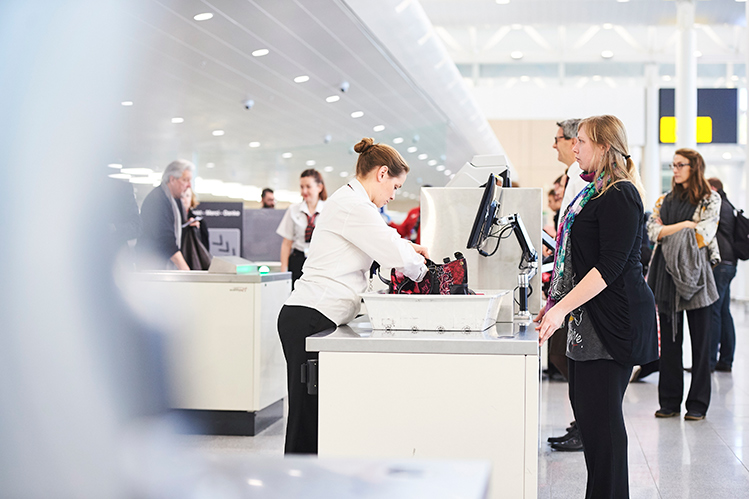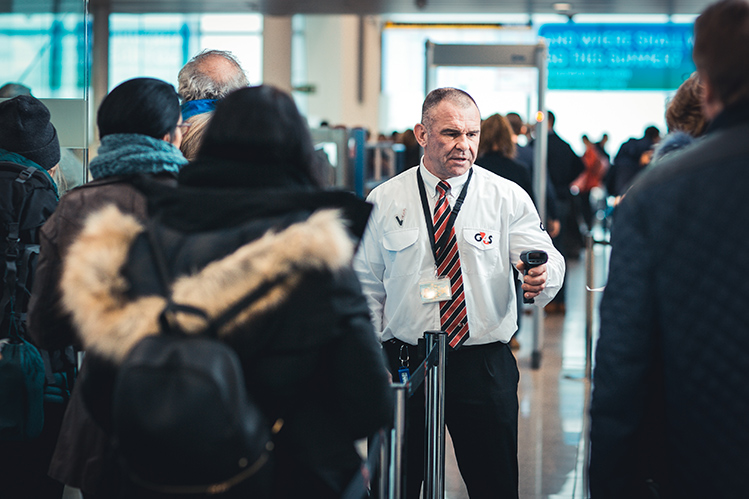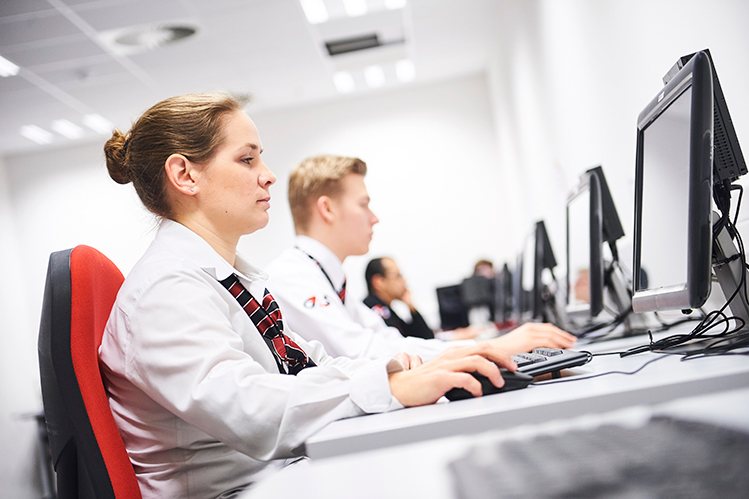An interview with Ronald Engels, Director, G4S Aviation Security. By Ross Falconer
Like every company on an airport, or related to the airport industry, G4S has suffered a huge impact from the COVID-19 pandemic. Passenger numbers declined rapidly and the majority of G4S’ employees have been at home since March.
“Where normally efficiency and passenger experience are key in the security process, G4S is now focused on the safety of its staff and passengers, as well as making a balance between social distance and trying to minimise waiting times,” begins Ronald Engels, Director, G4S Aviation Security. “Face masks and shields, thousands of nitrile gloves, hand sanitizer and disinfection towels are in use as everywhere in the world. Signs which say ‘prepare yourself for screening’ are replaced with signs urging ‘keep 1.5 metre distance’ and ‘wearing a mask is mandatory’.”

Ronald Engels, Director, G4S Aviation Security: “Where normally efficiency and passenger experience are key in the security process, G4S is now focused on the safety of its staff and passengers, as well as making a balance between social distance and trying to minimise waiting times.”
Despite all these changes, G4S is maintaining a business as usual approach, because 100% compliance with laws and regulations must remain in place. Within this legal framework, G4S has only made some small changes to its working model in the security lanes.
“The biggest challenge G4S is facing is how we keep all of our staff well-trained and motivated,” says Engels. “What alternative jobs can we offer to minimise our turnaround of employees? What capacity do we need for the upcoming months or year? These are questions raised daily, especially when we can speak of a real recovery of operations and serious increase in deployment of staff on a regular basis. The crisis we experience today is, however strange it sounds, much more difficult in many ways and areas compared to the terrorist attacks in March 2016.”
As with every crisis, there are also new opportunities. Whereas G4S’ partner Brussels Airport asked it to provide landside security after the terrorist attacks in March 2016, G4S is now providing fever detection for all departing passengers who want to enter the departure hall.
“When the crisis started, Brussels Airport asked us if we have experience with hardware and software for detecting temperature,” Engels explains. “Due to the wide scale of industries in which G4S is globally active, we were able to offer a total solution at very short notice. As we speak, G4S has deployed two complete fever detection lanes, including G4S security agents. G4S is proud to contribute to a safe and secure feeling for passengers and staff on the airport, and hopes it can keep contributing to the huge effort of Brussels Airport to stay open for all those other partners that make daily operation a success in these difficult times.”

G4S has deployed two complete fever detection lanes, including G4S security agents, at Brussels Airport. “G4S is proud to contribute to a safe and secure feeling for passengers and staff on the airport, and hopes it can keep contributing to the huge effort of Brussels Airport to stay open for all those other partners that make daily operation a success in these difficult times,” says Ronald Engels, Director, G4S Aviation Security.
“Inclusive entrepreneurship”
Inclusive entrepreneurship means striving for a healthy labour market with opportunities for everyone. Innovative companies are inclusive, as is G4S through multiple actions. “We attract different profiles and manage that diversity in a smart way, so that it stimulates our creativity and productivity,” says Engels.
G4S has started an innovative programme where people with Autism Spectrum Disorder (ASD) are trained to become a fully licensed security guard (X-ray screener) with screening qualifications. In addition, G4S has set up multiple workshops to support and develop the leadership skills of its supervisors and team leaders.
“We educate our managers on the benefits of diversity in the workplace. We have organised workshops on ‘Good practices on leadership for people with ASD’ and did the same for ‘Good practices on clear communication’,” Engels adds.
G4S employs 11 X-ray screeners with ASD. The company started this innovative project in collaboration with the organisation Passwerk, which specialises in job coaching for people with ASD. “G4S wanted to give special attention to Corporate Social Responsibility with this project,” Engels explains. “People with ASD are known to have limited social skills, but on the other hand they have a strong focus, a lot of attention to detail, and strong visual skills. Their strengths match the competences needed by X-ray screeners in particular.”
The training programme was slightly adapted to their needs and G4S and Passwerk provided individual coaching during the first year to make sure the integration was a success. Their task is remote X-ray screening of cabin baggage. The context of ‘remote’ X-ray screening makes it possible to create a low stimuli working environment in a separate screening room, which is a key factor for success when working with ASD employees.
Brussels Airport made it possible for G4S to start this project and integrate it into the normal operation. After G4S proposed it during one of its innovation meetings, it should be considered as a common initiative.
“In general, this group of X-ray screeners have a very high performance looking for example at Threat Image Projection results,” Engels comments. “They have an average decision-time, but can stay focused longer and can continue their X-ray screening task all day long. Another operational benefit is that there are no displacement times needed for any job rotation between the security platform and the remote screening room.”

G4S employs 11 X-ray screeners with Autism Spectrum Disorder (ASD). The company started this innovative project in collaboration with the organisation Passwerk, which specialises in job coaching for people with ASD.
Research has shown that people with ASD are disproportionately affected by unemployment. The current rapidly-changing work environment is very challenging, especially for people with ASD.
Engels explains that G4S has learned from experience that ASD X-ray screeners have slightly different needs than others during training and in the working environment, in order to be able to perform at their best. “G4S wanted to have more scientific-based knowledge about the factors that have an impact for the ASD employees and, therefore, contacted the University of Leuven. The current thesis research is focused on the effectiveness of the training for ASD X-ray screeners and their wellbeing on the job. The research is based on interviews with trainers/coaches and questionnaires filled in by the ASD X-ray screeners. The main goal of the thesis research is to formulate practical advice on the different factors that have an impact on the effectiveness of training and the wellbeing of ASD people in a working environment. The first results are to be expected in 2021.”
Language training courses
G4S has established multiple training courses for monolingual French-speaking applicants, so they can be hired and trained as a security guard at Brussels Airport where knowledge of the Dutch language is a contractual requirement.
“Pre-COVID hiring was the biggest challenge,” says Engels. “Finding the right number of employees was a race against the clock. As Brussels Airport is situated in Flanders, knowledge of the Dutch language is a basic contractual requirement. In Brussels there is a lot of potential, but most of the people don’t speak Dutch. We want to be able to attract monolingual French-speaking applicants and give them the opportunity to learn Dutch, so they can work as a G4S security guard at Brussels Airport.”
Finally, commenting on this year’s ACI EUROPE Annual Assembly & Congress, where G4S is a Gold Sponsor, Engels adds: “I expect that COVID-19 and the impact on the total industry will be the major topic, and hope that by sharing experiences and information we can survive this crisis and start looking to the future. Our key message is that sometimes a complete standstill is necessary to move forward in a better and stronger way.”







